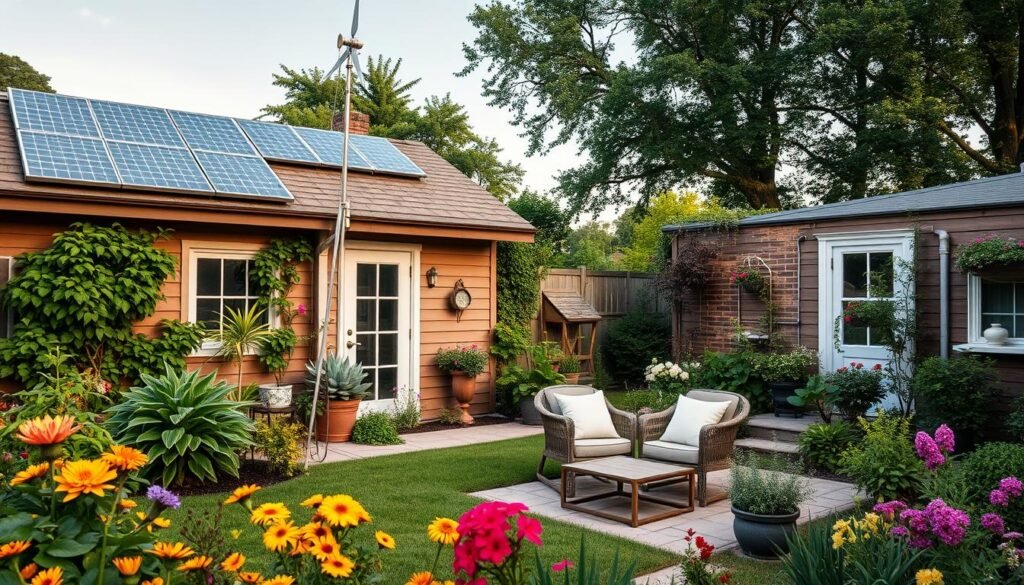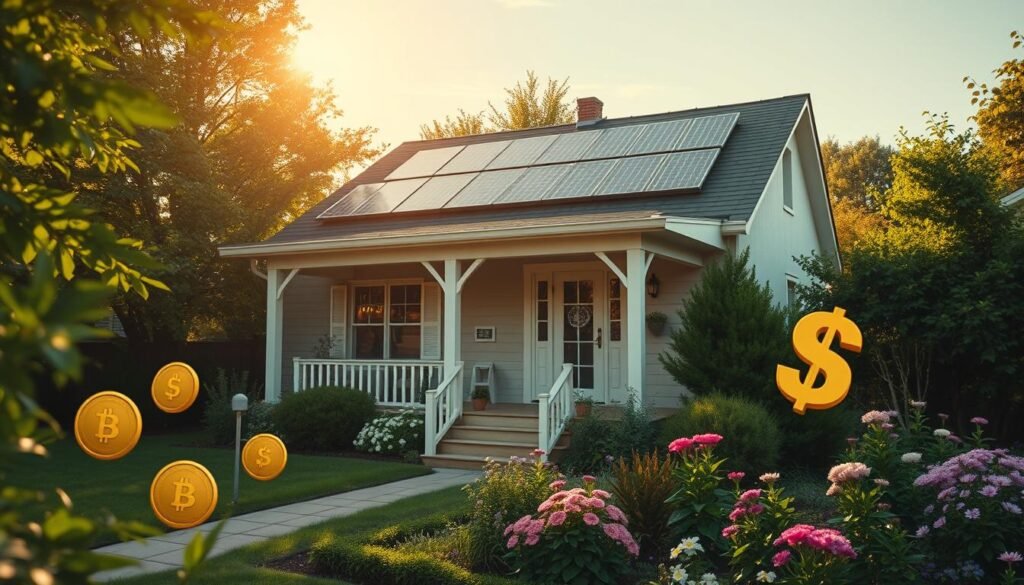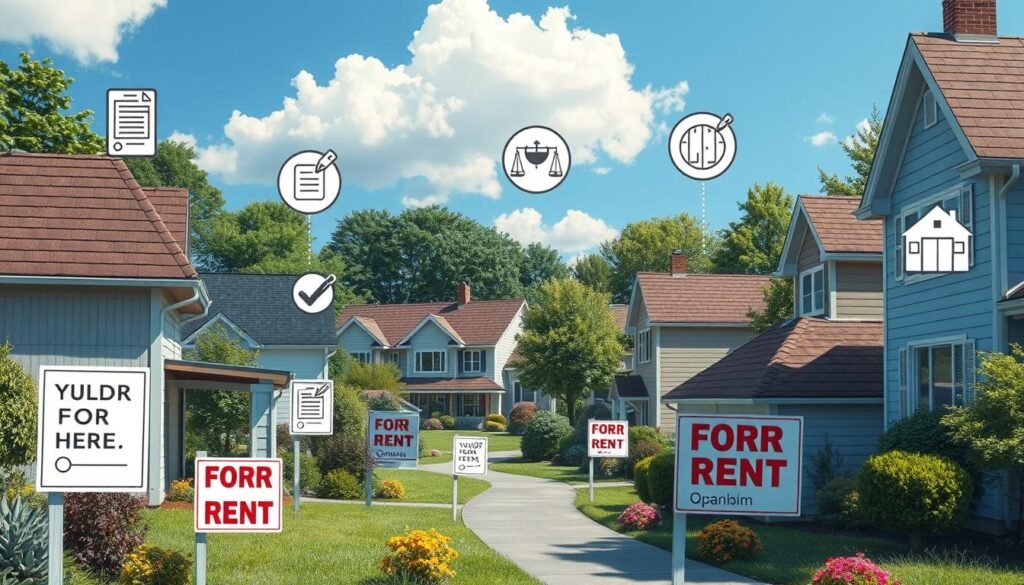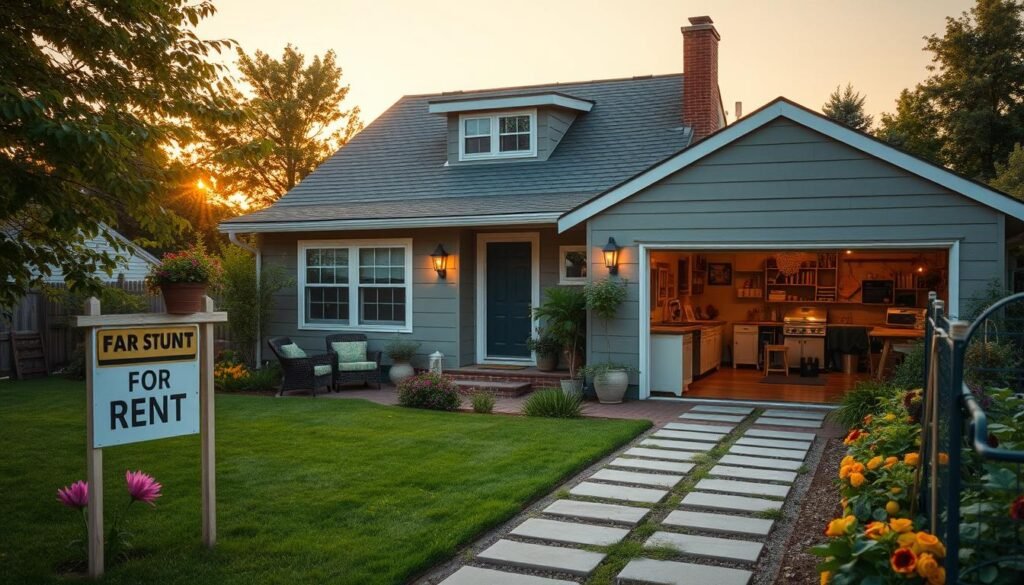Are you sitting on an untapped goldmine right in your own living space? What if your home could become more than just a place to live—but a powerful income generator? The dream of earning money with your house is no longer just a fantasy, but a realistic opportunity for homeowners looking to create passive income from property.
Today’s real estate landscape offers numerous innovative ways to transform your property into a revenue-generating asset. From short-term Airbnb rentals to creative space utilization, homeowners can unlock potential income streams that were unimaginable just a decade ago.
This comprehensive guide will walk you through strategic methods to earn money with your house, helping you maximize your property’s financial potential. Whether you’re seeking supplemental income or a substantial revenue boost, these proven strategies can help you turn your home into a profitable investment.
Key Takeaways
- Multiple strategies exist to generate income from your property
- Passive income opportunities can supplement your primary earnings
- Minimal initial investment can lead to significant financial returns
- Flexibility in rental and sharing options allows customized approaches
- Understanding local regulations is crucial for successful implementation
Understanding the Value of Your Home
Real estate investment starts with knowing your property’s true worth. Understanding your home’s value is crucial for monetizing extra space and making smart financial decisions. The right assessment can unlock potential income streams and help you maximize your property’s potential.
Several key factors significantly impact your home’s market value. These elements determine how much your property could earn through various monetization strategies.
Critical Factors Affecting Home Value
- Location and neighborhood quality
- Property size and square footage
- Home condition and recent renovations
- Local real estate market trends
- Economic conditions in your area
Assessing Your Home's Current Worth
Determining your home’s value requires a multi-step approach. Professional appraisals provide the most accurate assessment, but homeowners can also use multiple resources.
| Valuation Method | Accuracy Level | Cost |
|---|---|---|
| Online Valuation Tools | Moderate | Free |
| Professional Appraisal | High | $300-$500 |
| Comparative Market Analysis | Very High | Free (Real Estate Agent) |
“Know your property’s value before exploring investment opportunities.” – Real Estate Expert
By understanding these valuation methods, homeowners can make informed decisions about potential real estate investment strategies and ways of monetizing extra space.
Renting Out Your Home
Transforming your property into a rental income stream can be an excellent way to generate additional revenue. Homeowners have multiple options to rent out a room or entire living spaces, each with unique advantages and challenges.

Rental strategies vary widely, but understanding the fundamental approaches can help maximize your potential earnings. Property owners can explore different rental models that suit their lifestyle and financial goals.
Long-Term vs. Short-Term Rentals
When considering rental income streams, you’ll need to choose between long-term and short-term rental approaches:
- Long-Term Rentals
- Steady monthly income
- Lower maintenance frequency
- More predictable tenant relationships
- Short-Term Rentals
- Higher potential earnings
- More flexible scheduling
- Greater involvement required
Legal Considerations for Renting
Before you rent out a room or property, understanding local regulations is crucial. Research zoning laws, required permits, and potential restrictions in your area.
“Knowledge of local regulations can prevent costly legal complications down the road.” – Real Estate Expert
Tips for Being a Successful Landlord
Effective landlords focus on creating positive tenant experiences while protecting their investment. Key strategies include:
- Screen potential tenants thoroughly
- Maintain clear communication
- Keep the property well-maintained
- Understand tenant rights
- Set competitive but fair rental prices
By approaching rental income streams strategically, homeowners can turn their property into a profitable venture that provides financial flexibility and potential long-term wealth generation.
Home Sharing Platforms
The digital age has transformed how homeowners can generate income through vacation rental property opportunities. Airbnb hosting has become a popular way to monetize unused living spaces, offering flexible earning potential for property owners.

Home sharing platforms have revolutionized the rental market, providing homeowners with innovative ways to generate additional income. These digital marketplaces connect property owners with travelers seeking unique accommodations.
Overview of Airbnb and Vrbo
Two leading platforms dominate the vacation rental property landscape:
- Airbnb: Known for diverse property types from rooms to entire homes
- Vrbo: Specializes in entire home rentals for families and groups
| Platform | Property Types | Average Daily Rate |
|---|---|---|
| Airbnb | Rooms, Apartments, Houses | $160-$250 |
| Vrbo | Entire Homes, Vacation Properties | $250-$350 |
Setting Up Your Property for Guests
Successful Airbnb hosting requires careful preparation. Focus on creating welcoming spaces that attract potential guests:
- Clean and declutter thoroughly
- Invest in quality linens and comfortable furnishings
- Provide essential amenities like Wi-Fi and basic kitchen supplies
- Take high-quality, professional photographs
Managing Guest Relations
“Great hospitality turns first-time guests into repeat customers.” – Hospitality Expert
Effective communication is crucial in vacation rental property management. Respond promptly to inquiries, be transparent about house rules, and create a welcoming environment that encourages positive reviews.
By understanding these platforms and implementing strategic approaches, homeowners can transform their properties into profitable short-term rental experiences.
Selling Unused Items from Your Home
Transforming clutter into cash is an excellent way of monetizing extra space and generating passive income from property. Many homeowners overlook the potential revenue sitting in their closets, garages, and storage areas. By strategically selling unused items, you can quickly boost your household income.

Identifying Items to Sell
Start by conducting a thorough home inventory. Look for items in good condition that you no longer use or need. Potential sellable items include:
- Furniture in excellent condition
- Electronics with recent technology
- Collectible items and vintage pieces
- Sporting equipment
- Designer clothing and accessories
Best Platforms for Selling Online
Choosing the right platform can maximize your selling potential. Different platforms cater to specific types of items and buyer demographics.
| Platform | Best For | Typical Fees |
|---|---|---|
| eBay | Collectibles, Electronics | 10-15% of sale price |
| Facebook Marketplace | Local furniture, household items | Free |
| Poshmark | Clothing, Accessories | 20% for sales over $15 |
Organizing a Successful Yard Sale
A well-planned yard sale can quickly turn unused items into immediate cash. Strategic preparation is key to maximizing your profits.
“One person’s clutter is another person’s treasure” – Anonymous
- Price items competitively
- Advertise on local community boards
- Organize items neatly
- Have plenty of change available
- Be prepared to negotiate
By implementing these strategies, you can effectively transform unused household items into a lucrative passive income stream while decluttering your living space.
Home-Based Businesses
Transforming your home into a profitable workspace is an innovative way to earn money with your house. House hacking through home-based businesses offers flexible income opportunities without significant startup costs.

Exciting Service-Based Business Ideas
Numerous service-based businesses can be launched directly from your home environment. Consider these potential opportunities:
- Virtual consulting in professional fields
- Online tutoring and educational services
- Digital marketing support
- Freelance writing and content creation
- Graphic design and web development
Creating an Effective Home Office
Establishing a professional workspace is crucial for productivity. Select a quiet area with minimal distractions, invest in ergonomic furniture, and ensure reliable internet connectivity. Professional home office setups can significantly impact business success.
| Essential Home Office Equipment | Recommended Investment |
|---|---|
| Computer/Laptop | $800-$1500 |
| Ergonomic Chair | $200-$500 |
| High-Speed Internet | $50-$100 monthly |
Marketing Your Home Business
Effective marketing strategies can transform your home-based business. Leverage social media platforms, develop a professional website, and network within your industry to attract potential clients.
“Your home can be more than just a living space—it’s a potential business incubator.”
By implementing strategic approaches, you can successfully earn money with your house through innovative home-based business models.
Cashing In on Your Property's Space
Maximizing your property’s potential is a smart approach to house hacking and generating additional income. Homeowners have multiple creative ways to rent out a room or utilize unused spaces that can transform their living situation into a profitable venture.

Property owners can unlock hidden revenue streams by strategically repurposing different areas of their home. The key is identifying underutilized spaces and understanding their rental potential.
Creating a Rental Space
Transforming unused areas like basements or attics into rental units can significantly boost your income. Consider these potential conversion opportunities:
- Basement apartment with separate entrance
- Converted attic studio
- Backyard guest cottage
- Attached in-law suite
Subletting a Room
Rent out a room to generate consistent monthly income. When subletting, establish clear guidelines and screening processes for potential roommates.
| Subletting Considerations | Recommended Approach |
|---|---|
| Background Check | Verify employment and rental history |
| Lease Agreement | Create detailed contract with house rules |
| Shared Space Management | Define common area usage and cleaning expectations |
Using Your Garage for Storage Rentals
Urban dwellers constantly seek secure storage solutions. Your garage can become a profitable asset by offering storage space to neighbors or local businesses.
“Empty spaces are missed opportunities for generating passive income.” – Real Estate Investment Expert
House hacking through strategic space rental requires careful planning, but can provide substantial financial benefits with minimal additional effort.
Adding Value Through Renovations
Real estate investment demands strategic thinking, especially when it comes to property improvements. Renovations can dramatically boost your home’s value and generate passive income from property. Smart upgrades transform your property from a simple living space into a lucrative investment opportunity.

High-ROI Renovations for Rental Success
Certain renovations offer exceptional returns for property investors. Focus on upgrades that directly impact rental potential:
- Kitchen remodels with modern appliances
- Bathroom updates with contemporary fixtures
- Energy-efficient windows and insulation
- Fresh paint and neutral color schemes
“The right renovation can increase property value by up to 20% and attract higher-quality tenants.” – Real Estate Investment Experts
Renovation Tips to Attract Buyers
When considering future sale potential, prioritize improvements with broad appeal. Curb appeal matters significantly in real estate investment. Landscaping, exterior paint, and welcoming entryways can make substantial differences in market perception.
DIY vs. Hiring Professionals
Weighing the pros and cons of do-it-yourself renovations requires careful consideration. While DIY can save money, professional work often yields higher-quality results that truly enhance passive income from property.
- DIY Benefits:
- Lower upfront costs
- Personal satisfaction
- Professional Advantages:
- Expert craftsmanship
- Faster completion
- Potential warranty
Strategic renovations are a powerful tool in real estate investment. By carefully selecting improvements that enhance value and attract tenants, homeowners can transform their property into a profitable asset.
Eco-Friendly Options
Homeowners are increasingly discovering innovative ways to monetize extra space while contributing to environmental sustainability. Eco-friendly solutions offer unique opportunities to generate income and support green initiatives.

Transforming your property into an eco-friendly income generator requires creativity and strategic planning. Several approaches can help you maximize your property’s potential while supporting sustainable practices.
Solar Panel Installation for Income
Solar energy presents a remarkable opportunity for passive income from property. Homeowners can generate electricity and potentially sell excess energy back to the grid, creating a steady revenue stream.
- Install high-efficiency solar panels
- Connect to local energy grid
- Leverage government tax incentives
Renting Your Land for Agricultural Purposes
Unused land can become a valuable asset for monetizing extra space. Local farmers or community gardening groups might be interested in leasing agricultural space.
| Land Type | Potential Income | Required Maintenance |
|---|---|---|
| Vacant Lot | $500-$1,500/year | Minimal |
| Pasture Land | $50-$150 per acre/month | Low |
Creating a Sustainable Habitat
Develop an eco-friendly space that attracts nature enthusiasts and potential educational programs. This approach can generate income while preserving local ecosystems.
“Sustainable property development is not just about income—it’s about creating value for the environment and community.” – Green Living Experts
By implementing these eco-friendly strategies, homeowners can transform their properties into sustainable income generators that benefit both their finances and the planet.
Utilizing Your Home's Outdoor Space
Homeowners are discovering innovative ways to earn money with your house by transforming outdoor spaces into profitable opportunities. Monetizing extra space has become an exciting trend for property owners looking to generate additional income.

Your backyard and garden can be more than just a recreational area. With creative thinking, these spaces can become valuable income-generating assets that enhance your property’s potential.
Hosting Memorable Backyard Events
Backyard event hosting offers a unique way to earn money from your property. Potential event opportunities include:
- Wedding ceremonies and receptions
- Private parties and celebrations
- Outdoor movie screenings
- Photography and film shoot locations
“A well-designed outdoor space can transform from a simple backyard to a profitable event venue.”
Garden Space Rental Opportunities
Urban dwellers without access to green spaces are seeking garden rentals for various purposes. Platforms like specialized rental sites can help you connect with potential renters interested in gardening or outdoor activities.
| Rental Option | Potential Earnings | Time Commitment |
|---|---|---|
| Community Garden Plot | $50-$200/month | Low |
| Photography Location | $100-$500/session | Flexible |
| Event Space Rental | $500-$2000/event | Moderate |
By strategically leveraging your outdoor spaces, you can create multiple income streams while maximizing your property’s potential. Start small, understand local regulations, and gradually expand your monetization strategies.
Financial Incentives and Grants
Navigating the world of real estate investment can be complex, but understanding financial incentives and grants can significantly boost your rental income streams. Homeowners have access to numerous programs that can help maximize their property’s earning potential and reduce overall expenses.

Government programs offer substantial support for homeowners looking to enhance their property’s value and generate additional income. These initiatives can provide critical financial advantages for those interested in real estate investment.
Government Programs for Homeowners
- Energy Efficiency Grants: Support for green home improvements
- Historic Preservation Incentives: Financial aid for maintaining historic properties
- Affordable Housing Programs: Opportunities for rental property owners
Tax Benefits of Renting Your Home
Rental income streams come with significant tax advantages that can improve your financial picture. The IRS provides several deductions for property owners who rent out their spaces.
| Deduction Category | Potential Tax Savings |
|---|---|
| Mortgage Interest | Up to 100% deductible |
| Property Depreciation | Annual deduction of property value |
| Repair and Maintenance Costs | Fully deductible expenses |
“Smart homeowners understand that strategic tax planning can transform a property from a simple asset to a powerful financial tool.” – Real Estate Investment Experts
Researching and leveraging these financial incentives requires careful planning. Consult with a tax professional to maximize your potential savings and ensure compliance with local regulations.
By understanding these opportunities, homeowners can turn their properties into more profitable real estate investments while benefiting from government support and tax advantages.
Maximizing Profit Through Marketing
Successful vacation rental property management goes beyond simply listing your space. Strategic marketing can dramatically increase your Airbnb hosting potential and attract more guests. The key is creating a compelling online presence that stands out in a competitive market.

Effective marketing requires a multi-dimensional approach that leverages digital platforms and visual storytelling. Professional photography plays a crucial role in capturing potential guests’ attention.
Crafting Compelling Property Presentations
- Invest in high-quality, professional photos that showcase your space’s unique features
- Write engaging, descriptive property descriptions
- Highlight special amenities and local attractions
- Create a narrative that helps guests imagine their stay
Social Media Marketing Techniques
Social media platforms offer powerful tools for promoting your Airbnb hosting efforts. Strategic social media integration can significantly expand your reach and attract potential guests.
| Platform | Marketing Strategy | Potential Reach |
|---|---|---|
| Visual storytelling | High engagement | |
| Targeted advertising | Broad demographic | |
| Travel inspiration | Travel-focused audience |
“Your property’s online presence is its first impression – make it count!” – Hospitality Marketing Expert
Remember that consistent, authentic content builds trust with potential guests. Share behind-the-scenes glimpses, local recommendations, and create a brand that reflects your unique vacation rental property’s personality.
Home Inspection and Maintenance

Successful house hacking relies on consistent property maintenance. Regular home inspections are crucial for protecting your rental income streams and preventing costly unexpected repairs.
Proactive maintenance helps homeowners maximize their property’s value and attractiveness to potential tenants. Small investments in upkeep can prevent significant financial headaches down the road.
Critical Maintenance Checklist for Rental Properties
- Inspect structural elements quarterly
- Check plumbing and electrical systems annually
- Maintain HVAC equipment every six months
- Replace air filters every 3-4 months
- Examine roof and exterior for potential damage
Preparing for Tenant Move-Ins
Creating an inviting and well-maintained space attracts quality tenants. A thorough cleaning and comprehensive safety check are essential steps in house hacking strategies.
“A well-maintained property is the foundation of sustainable rental income streams.” – Real Estate Investment Experts
Essential Pre-Tenant Preparation Steps
- Deep clean entire property
- Perform safety system checks
- Document property condition with photographs
- Repair any visible damages
- Ensure all appliances function correctly
Investing time in thorough maintenance pays dividends through increased tenant satisfaction, longer occupancy, and more stable rental income streams.
Understanding Home Insurance
Real estate investment comes with significant risks, especially when generating passive income from property. Home insurance plays a crucial role in protecting your financial interests as a property owner and landlord.

Navigating the complex world of insurance requires careful consideration and strategic planning. Property owners must understand the nuanced coverage options available to safeguard their investments.
Insurance Considerations for Landlords
Landlord insurance differs significantly from standard homeowner policies. Key coverage areas include:
- Property damage protection
- Liability coverage for tenant-related incidents
- Lost rental income protection
- Legal expense coverage
“Proper insurance is your financial safety net in real estate investment.” – Real Estate Experts
Protecting Your Investment
To maximize your passive income from property, consider these insurance strategies:
- Choose comprehensive landlord policies
- Regularly review and update coverage
- Understand specific policy exclusions
- Maintain detailed property documentation
Investing in robust insurance protects your real estate venture from unexpected financial challenges, ensuring long-term stability and peace of mind.
The Impact of Local Regulations
Navigating the complex landscape of local regulations is crucial for homeowners looking to generate income through Airbnb hosting or home-sharing opportunities. Understanding the legal framework can protect your investment and ensure smooth operations.

Local governments have specific rules that can significantly impact your ability to generate home-sharing income. These regulations vary widely between cities and neighborhoods, making research essential for potential property owners.
Zoning Laws and Property Usage
Zoning regulations can dramatically affect your home-sharing plans. Some key considerations include:
- Residential vs. commercial zoning restrictions
- Occupancy limits for short-term rentals
- Parking and neighborhood density requirements
- Minimum rental duration regulations
Navigating Local Rental Regulations
“Knowledge of local laws is your first line of defense in successful Airbnb hosting.” – Real Estate Legal Expert
To successfully navigate local rental regulations, homeowners should:
- Contact local municipal offices for specific guidelines
- Obtain necessary permits for short-term rentals
- Review homeowners association (HOA) rules
- Understand potential tax implications
Proactive research and compliance can help you maximize your home-sharing income while avoiding potential legal complications.
Managing Finances as a Homeowner
Transforming your property into a source of rental income streams requires strategic financial management. Successful homeowners understand that passive income from property demands careful planning and meticulous tracking of expenses and revenues.

Effective financial management goes beyond simple bookkeeping. It involves creating a comprehensive strategy that maximizes your property’s earning potential while minimizing unexpected costs.
Budgeting for Home Maintenance
Maintaining your rental property is crucial for sustainable income generation. Experts recommend setting aside 1-3% of your property’s value annually for maintenance and repairs.
- Create a dedicated maintenance fund
- Schedule regular property inspections
- Prioritize preventative repairs
Tracking Rental Income and Expenses
Accurate financial tracking is essential for maximizing your rental property’s potential. Consider using specialized accounting software designed for property management.
| Expense Category | Recommended Tracking Method |
|---|---|
| Maintenance Costs | Digital receipt tracking |
| Rental Income | Automated income logging |
| Property Taxes | Annual tax preparation software |
“Financial success in real estate is about smart management, not just ownership.” – Real Estate Investment Experts
By implementing robust financial practices, you can transform your property into a reliable source of passive income. Regular review and adaptation of your financial strategy will help you stay competitive in the rental market.
Conclusion: Choosing the Right Path
Exploring ways to earn money with your house requires careful consideration of your unique circumstances. Each property offers distinct opportunities for generating additional income, from home-sharing platforms to rental strategies and innovative space utilization. The key is matching your specific property attributes with the most suitable income-generating approaches.
Successful home-sharing income relies on strategic planning and realistic expectations. Property owners should conduct thorough market research, understand local regulations, and assess their personal comfort level with different monetization methods. Some homeowners might excel at short-term rentals, while others may prefer long-term tenant arrangements or specialized services like storage rentals.
Assessing Which Options Suit You
Your ideal approach to earn money with your house depends on several crucial factors. Consider your property’s location, available space, local market demand, and personal time commitment. Urban properties might benefit from Airbnb rentals, while rural properties could generate income through agricultural land leasing or event hosting.
Next Steps to Start Earning Money with Your House
Begin by evaluating your property’s potential income streams. Create a detailed business plan, research necessary permits, and understand potential tax implications. Consult local real estate professionals, review insurance requirements, and start with low-risk strategies that align with your comfort level. Remember, successful property income generation requires ongoing management and adaptability.
FAQ
Is it legal to rent out part of my house?
Legality depends on local zoning laws and regulations. Before renting out any part of your property, check with your local municipality, homeowners association, and review your property’s deed restrictions. Some areas have specific rules about short-term rentals and home-sharing that you must comply with to avoid potential fines or legal issues.
How much money can I realistically earn by renting out my property?
Earnings vary widely based on location, property type, and rental strategy. Short-term rentals through platforms like Airbnb can generate 0-,000 monthly, while long-term rentals might provide
FAQ
Is it legal to rent out part of my house?
Legality depends on local zoning laws and regulations. Before renting out any part of your property, check with your local municipality, homeowners association, and review your property’s deed restrictions. Some areas have specific rules about short-term rentals and home-sharing that you must comply with to avoid potential fines or legal issues.
How much money can I realistically earn by renting out my property?
Earnings vary widely based on location, property type, and rental strategy. Short-term rentals through platforms like Airbnb can generate $500-$3,000 monthly, while long-term rentals might provide $1,000-$2,500 per month. Factors like local market demand, property condition, and pricing strategy significantly impact potential income.
What insurance do I need when renting out my property?
You’ll need landlord insurance, which differs from standard homeowners insurance. This specialized coverage protects against property damage, liability claims, and potential loss of rental income. Some platforms like Airbnb offer additional host protection, but it’s crucial to have comprehensive coverage that addresses the unique risks of renting out your property.
Do I need to pay taxes on rental income?
Yes, rental income is taxable and must be reported to the IRS. However, you can also deduct qualifying expenses such as property maintenance, insurance, utilities, and depreciation. Consult a tax professional to understand your specific tax obligations and potential deductions related to rental income.
What are the best platforms for renting out my property?
Popular platforms include Airbnb, Vrbo, and Booking.com for short-term rentals. For long-term rentals, consider Zillow Rentals, Trulia, and local real estate websites. Each platform has different fees, target markets, and requirements, so research which best suits your property and rental strategy.
How can I prepare my home for rental guests?
Prepare by thoroughly cleaning and decluttering your space, investing in quality furnishings, providing essential amenities, and creating a welcoming environment. Take high-quality photos, write a detailed description, and ensure your space meets safety standards. Consider professional staging to make your property more attractive to potential renters.
What are the risks of renting out my property?
Potential risks include property damage, problematic tenants, liability issues, increased wear and tear, and potential conflicts with neighbors or local regulations. Mitigate these risks through comprehensive insurance, thorough tenant screening, clear rental agreements, and maintaining open communication with guests or tenants.
How do I determine the right rental price?
Research comparable properties in your area, consider seasonal demand, analyze local market rates, and use pricing tools provided by rental platforms. Factor in your property’s unique features, location, and amenities. Dynamic pricing strategies can help maximize your rental income while remaining competitive.
What insurance do I need when renting out my property?
You’ll need landlord insurance, which differs from standard homeowners insurance. This specialized coverage protects against property damage, liability claims, and potential loss of rental income. Some platforms like Airbnb offer additional host protection, but it’s crucial to have comprehensive coverage that addresses the unique risks of renting out your property.
Do I need to pay taxes on rental income?
Yes, rental income is taxable and must be reported to the IRS. However, you can also deduct qualifying expenses such as property maintenance, insurance, utilities, and depreciation. Consult a tax professional to understand your specific tax obligations and potential deductions related to rental income.
What are the best platforms for renting out my property?
Popular platforms include Airbnb, Vrbo, and Booking.com for short-term rentals. For long-term rentals, consider Zillow Rentals, Trulia, and local real estate websites. Each platform has different fees, target markets, and requirements, so research which best suits your property and rental strategy.
How can I prepare my home for rental guests?
Prepare by thoroughly cleaning and decluttering your space, investing in quality furnishings, providing essential amenities, and creating a welcoming environment. Take high-quality photos, write a detailed description, and ensure your space meets safety standards. Consider professional staging to make your property more attractive to potential renters.
What are the risks of renting out my property?
Potential risks include property damage, problematic tenants, liability issues, increased wear and tear, and potential conflicts with neighbors or local regulations. Mitigate these risks through comprehensive insurance, thorough tenant screening, clear rental agreements, and maintaining open communication with guests or tenants.
How do I determine the right rental price?
Research comparable properties in your area, consider seasonal demand, analyze local market rates, and use pricing tools provided by rental platforms. Factor in your property’s unique features, location, and amenities. Dynamic pricing strategies can help maximize your rental income while remaining competitive.



